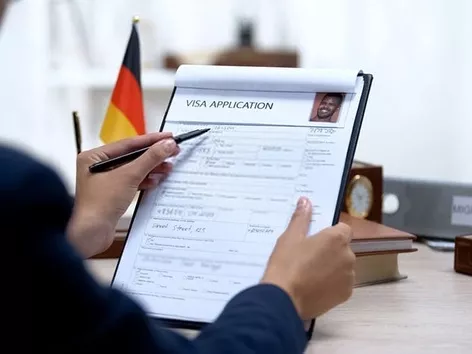Study in Germany 2025: How a Foreign Student Can Enter German Universities
Table of contents
- How many international students are studying in Germany?
- How to Get a German Student Visa in 2025?
- Application Deadlines for German Universities
- Best Universities in Germany for International Students
- Popular Study Programs Among International Students
- Is German required to study in Germany?
- Prospects for international students after graduation in Germany

In 2025, Germany continues to be a popular destination for international students due to its high level of education, affordability and numerous career opportunities after graduation. Find out how to apply for a student visa, which universities are best for international students and much more useful information about education
Germany has been one of the best destinations for international students for many years, as the country has a high level of education, many famous universities and low tuition fees compared to other Western countries.
Germany is actively developing as the most popular destination for international students. In particular, the number of issued study visas in Germany has increased by 43% over the past 3 years. Citizens of many countries of the world, including representatives of Afghanistan, Zimbabwe and Iraq, are studying here.
Read on to learn about the current procedure for obtaining a student visa, the best universities to study, popular study programs, the need for knowledge of the German language and prospects after graduation in Germany.
Choose a reliable health insurance policy on the Visit World portal to protect yourself from unforeseen expenses during your move. Support from a trusted insurance agent with a guaranteed payout in just a couple of clicks!
How many international students are studying in Germany?
According to data published by the German Ministry of the Interior, in 2021 about 63,000 study visas were issued. Three years later, in 2024, the authorities issued a total of 90,000 student visas.
How to Get a German Student Visa in 2025?
If you are not a student from an EU country, you will need to apply for a student visa to study in Germany. The process is simple, but requires paying attention to deadlines and preparing the necessary documents.
Step 1 – Apply to the University
Before applying for a visa, you must first apply and be accepted to a German university. Admission requirements vary depending on the university and program, but in general you will need:
- A recognized secondary school diploma equivalent to the German Abitur (secondary school leaving certificate).
- Proof of language proficiency (usually German or English, depending on the program).
- A motivation letter or statement of purpose.
- Letters of recommendation (for postgraduate programs).
Step 2 – Gather the necessary documents
Once you have been accepted to the institution, prepare the documents for obtaining a student visa:
- Valid passport.
- Confirmation of university admission (including acceptance letter).
- Proof of financial means to live in Germany (approximately 11 904 euros in a blocked account or a scholarship - this deposit ensures that international students can withdraw 992 euros per month for 12 months to cover their living expenses, which is a requirement for obtaining a German visa).
Important! If you plan to open a blocked account to demonstrate financial security, make sure that this process is completed in advance, as it can take some time.
- Proof of health insurance.
- Visa application form and biometric photos.
- Proof of language proficiency (German or English, depending on the program).
Step 3 – Apply for a visa
Once you have received an acceptance letter from the German university, you can start the visa application process. It is important to note that applying for a student visa is not immediate, so you should plan accordingly.
- When to apply for a student visa?
Start the visa application process at least 3-4 months before you plan to travel to Germany. The visa processing time can take between 6 weeks and 3 months, depending on your country of origin and the number of applications at the consulate.
Once your visa is approved, you can enter Germany and start your studies.
Step 4 - Obtaining a residence permit
Once you are in Germany, within the first few weeks after your arrival, you will need to apply for a residence permit at the local immigration office (Ausländerbehörde). This is usually done before the 90-day visa you receive upon entry expires. This permit will allow you to stay in Germany for the duration of your studies.
Application Deadlines for German Universities
Students planning to apply to German universities can start their studies in the winter or summer:
- Application Deadline for Winter intake – July 15
- Application Deadline for Summer intake – January 15
These application deadlines may vary from one university or study program to another. Always check the dates and start the application process well in advance. This will give you an advantage if you need to resubmit some documents or if something unexpected happens.
Important! Check university websites regularly: Universities sometimes update deadlines or change admission criteria, so be sure to check the official websites frequently for any changes.
Best Universities in Germany for International Students
Germany boasts a large number of prestigious universities that are consistently ranked among the best in the world. Here are some of the best institutions for international students:
- LMU Munich (Ludwig Maximilian University) – one of the oldest and most prestigious universities in Germany, offering a wide range of programs in the humanities, natural sciences, and social sciences.
- Technische Universität München (TUM) – known for its programs in engineering, technology, and natural sciences.
- Heidelberg University – popular research programs in fields such as life sciences, humanities, and medicine.
- Humboldt University of Berlin – known for its research-oriented education and active international community.
- University of Freiburg – a top university in fields such as environmental sciences, engineering, and humanities.
- University of Mannheim – highly regarded for its programs in business, economics, and social sciences.
Popular Study Programs Among International Students
Germany offers a wide range of programs in numerous fields, making it an attractive destination for international students. Some of the most popular study programs among international students include:
- Engineering: Germany is known for its engineering programs, especially in the fields of mechanical, automotive, electrical, and civil engineering. These programs are in high demand due to Germany’s thriving industrial sector.
- Computer Science and IT: With the rise of digitalization, students from all over the world are flocking to Germany for programs in computer science, artificial intelligence, and data science.
- Business Administration and Economics: Germany is home to a number of world-class business schools, and its strong economy provides ample opportunities for graduates.
- Medicine and Health Sciences: Many international students pursue degrees in medicine, nursing, or healthcare in Germany, as the country offers high-quality medical education.
- Environmental and Sustainability Studies: As an environmentally conscious country, Germany offers top-notch programs in ecology, renewable energy, and sustainability.
- Humanities and Social Sciences: With its rich cultural history, Germany is a great choice for students interested in philosophy, history, sociology, and political science.
Is German required to study in Germany?
German is highly recommended for international students in Germany, but the need varies by program and region.
- English-Language Programs
Many universities in Germany offer master’s and even bachelor’s programs entirely in English, especially in fields such as engineering, business, and computer science. If you plan to study in such a program, you may not need to know German.
- German-Language Programs
For bachelor’s programs and many other fields, knowledge of German is crucial. Most undergraduate programs are taught in German, and knowledge of the language is essential to understand lectures and participate in everyday life. Universities usually require proof of German proficiency through exams such as the TestDaF or DSH.
- Language courses
If you are not yet fluent in German, many universities offer language courses to help international students improve their skills before starting their program. It is also a great way to immerse yourself in German culture.
Prospects for international students after graduation in Germany
Germany is known for its strong job market, especially in industries such as mechanical engineering, IT and healthcare. As an international student, here is what you can expect after graduation:
- Postgraduate job opportunities
After graduation, you can stay in Germany for up to 18 months to look for a job related to your field of study. During this time, you can also apply for a permanent residence permit.
- Employment sectors
Graduates from German universities are in high demand in sectors such as:
1. Engineering: Many leading German companies such as Siemens, BMW and Volkswagen actively recruit engineers from local universities.
2. IT and technology: Germany’s tech scene is booming, with cities such as Berlin, Munich and Hamburg becoming hubs for tech startups and global IT companies.
3. Business and Economics: With a strong economy and a high demand for qualified business professionals, Germany offers excellent career prospects for business school graduates.
4. Healthcare. The healthcare sector is growing, and there is a constant demand for healthcare professionals, especially in the healthcare and medical fields.
- Own your own business
Germany also has a thriving startup culture, especially in Berlin, which is home to a wide range of innovative technology companies. If you have an entrepreneurial spirit, Germany offers many opportunities to start a business, especially in areas such as technology, renewable energy, and sustainable development.
Studying in Germany in 2025 remains an excellent choice for international students seeking a higher education in a country with a rich cultural history and a growing economy. Whether you want to study engineering, business, computer science or humanities, Germany offers a wide range of programs in German and English.
Obtaining a study visa is a complex process that involves preparing a large number of documents. Order the "Study Guide" from the Visit World team to find out what documents you need to prepare for a student visa to Germany, as well as get useful tips for entering foreign universities.
Reminder! Germany is one of the key countries of the European Union, which can guarantee a high standard of living not only for citizens, but also for expats and migrants. Germany is chosen for temporary or permanent relocation, because it has a strong economy, developed infrastructure, rich culture and stability. We have already told you how much it costs to live in Germany in 2024-2025.
Products from Visit World for a comfortable trip:
Checklist for obtaining a visa and necessary documents in Germany;
Legal advice on business issues in Germany;
Travel insurance for foreigners in Germany;
Medical insurance around the world.
We monitor the accuracy and relevance of our information, so if you notice any errors or inconsistencies, please contact our hotline.
Frequantly
asked questions
Is it worth going to Germany in 2025?
Is it easy for international students to study in Germany?
How many years can a student stay in Germany?
Recommended articles
2 min
Work
Work in Germany in 2025: work visa, vacancies and changes in migration legislation
In 2025, Germany introduced visa reforms to attract talent from around the world, as the country faces a severe labor shortage. In particular, during this year the country planned to issue 400,000 work visas. Find out what changes to migration legislation await foreigners in Germany in 2025, which positions are better for expats to get a job and the current procedure for obtaining a work visa
10 Feb. 2025
More details1 min
Expats
Germany has launched a revolutionary online portal that will significantly simplify the visa application process from January 1, 2025. The new platform will allow applicants from anywhere in the world to apply for a tourist, student or work visa digitally. Find out what is already known about the German consular services portal
07 Jan. 2025
More details1 min
Work
Job seeker visa Germany: what kind of permit is it, how to get a visa and a package of documents
Germany is a European country with the strongest economy in the region and a developed social sphere. Many foreigners dream of living and working in this country, but to move you need to get a visa. One of the available types of permits is a job seeker visa. Find out who can get this type of visa and how to apply for a German job seeker visa
27 Jan. 2025
More details1 min
Work
Applying for a work visa in Germany: why might it be refused?
The procedure for obtaining a work visa to Germany is quite complicated and requires the preparation of a large package of documents. Find out why expats may be denied a permit and what to do to prevent this
19 Feb. 2025
More detailsAll materials and articles are owned by VisitWorld.Today and are protected by international intellectual property regulations. When using materials, approval from VisitWorld.Today is required.
